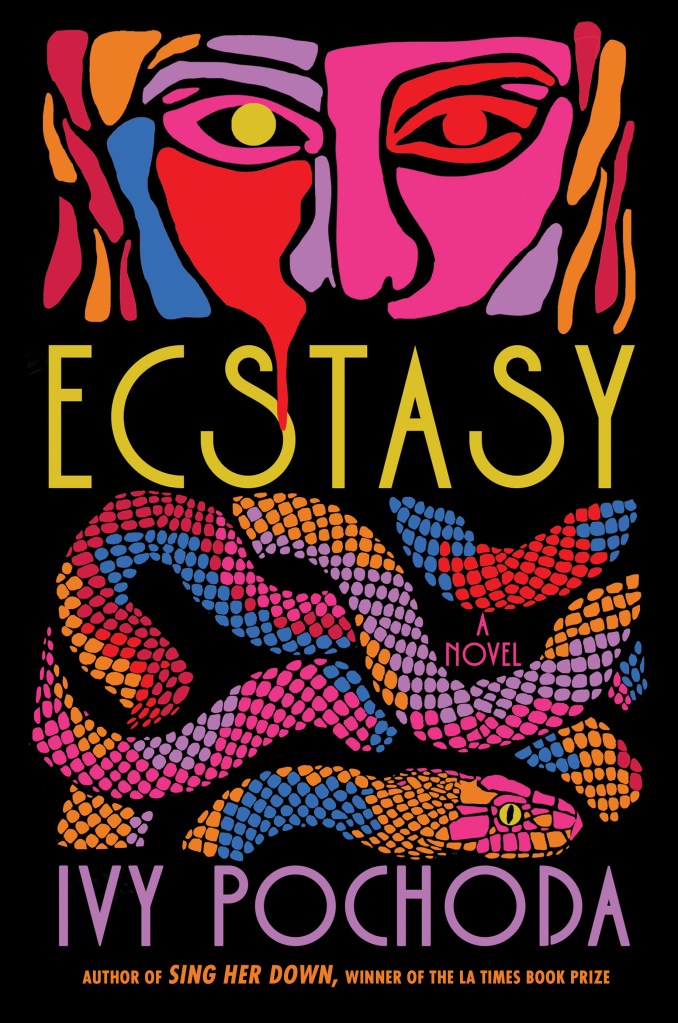King Pentheus of Thebes and his mother, Agave, become the target of the god Dionysus’ wrath for rejecting his sybaritic cult in the ancient Greek tragedy “The Bacchae.”
In “Ecstasy,” Ivy Pochoda’s new feminist retelling, Dionysus is an international DJ with a cult following in the Electronic Dance Music, or EDM, and rave scene. Pentheus and Agave become Drew and his mother, Lena — heir and widow to a deceased hotel magnate opening a new luxury resort on a Greek island.
It’s a bloody story in the old and new, rife with decadence and depravity — one with timeless appeal judging from the multitude of stagings and adaptations over the centuries.
For Pochoda, the new project additionally marks a return to an early love — and an earlier self.
“I did Latin and Greek in middle and high school, and I was really good at it,” said Pochoda, a 1998 graduate in classics and literature. “And one of the reasons I wanted to go to Harvard was because of their classics department.”
Raised in Brooklyn, Pochoda attended high school at St. Ann’s — a private school with no grades, no set curriculum, and a philosophy of being “systematically asystematic.” One year, her teachers led the class through a translation of Ovid’s “Metamorphosis.” During another they spent the entire year translating Euripides.
“I spent my senior year in high school translating ‘The Bacchae,’” Pochoda said. “We did it start to finish, and it was really a cool experience for a 17-year-old to get that immersed in a text. And it was never really far from my brain.”
But in College, Pochoda said, it was hard to immerse herself in ancient stories in the same way.
“I found out in College that being interested in classics and being interested in mythology are not the same thing,” she said. “When I was in high school, it sort of was — we were able to overlap.”
Pochoda said it seemed to her that having a concentration in classics meant translating — like, all the time.
She wanted to spend more time discussing meaning and themes, the part of ancient storytelling that brought her joy. That’s why, halfway through her undergraduate study, Pochoda decided she would switch concentrations.
“And there was this concentration called classics and secondary fields, which was not meant to be combined with English. But I did it, and I combined it through the study of dramatic literature, which brought me back to ‘The Bacchae’ and plays that I love.”
“It took me back to where I started from, which is being academic, but also creative, and applying that academia to performance and to things that are just a little off the beaten path.”
To fulfill the novel requirements set forth by combining literature and classics, Pochoda began taking classes at American Reparatory Theater, alongside creative writing courses. She reminisces fondly about her classes with Professor Emeritus Robert Brustein and associate Robert Scanlan.
“It took me back to where I started from, which is being academic, but also creative, and applying that academia to performance and to things that are just a little off the beaten path,” she said. “Being an undergraduate and taking classes with students in the arts and working with the art professors and actually thinking about why I was studying Greek and why I was studying English literature through a dramatic focus, was a really interesting tunnel.”
The setting of “Ecstasy” is far from the ivy-covered buildings of Cambridge, or even the metropolis of Los Angeles, where she lives now with her 10-year-old-daughter, but Pochoda said there is real life inspiration at play.
“Ecstasy” is set largely on the island of Naxos — a destination to which she took a trip in 2018 when working on the “Epoca” series with Kobe Bryant.
In addition to her real-life island retreat, Pochoda has also dabbled in the world of EDM. In her previous life as captain of the women’s squash team at Harvard, followed by nine years playing professionally in Europe, Pochoda got out her fair share.
“I’m not some super hardcore EDM person, but I do know about it. I mean, I’ve been to some raves and parties, which was a problem for me academically,” she said, laughing. “I will talk about it openly,” she added.
As for the decision to transpose this culture onto that of the ancient Greek god known for his love of wine and sex and revelry, Pochoda said that was easy.
“When I was thinking about what’s going on in that play, those women are raving for all intents and purposes.”
“When I was thinking about what’s going on in that play, those women are raving for all intents and purposes,” she said. “In the early EDM, early trance parties, early underground music, there was a lot of suspicion of what was going on and a lot of worry that the music was making you crazy and the drugs were making you crazy. So in the book, I try to use the idea of a beat, or beats, and the build-ups of EDM.”
But to be clear, Pochoda said, this is not quite a cautionary tale.
“The main characters, they want to go to the beach and party their faces off and reconnect with their youthful exuberance and the permissiveness of youth — the permissiveness of women being allowed to do what they want to do without men telling them what they want to do, what they can’t do,” she said. “But there is a dark side to that.”
